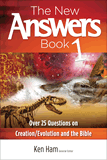Scare tactics
NCSE sets out to scare parents away from new Creation Museum
The National Center for Science Education (NCSE) headed by Dr. Eugenie Scott has started a campaign to try to discourage parents from bringing their children to the Creation Museum.
[Editor’s note: we express our condolences to Dr. DeWitt and the entire staff—and students—of Liberty University on the passing of the school’s founder, Dr. Jerry Falwell, earlier this week. Dr. Falwell was a strong supporter of biblical creation. Please pray for the Falwell family, Thomas Road Baptist Church, and Liberty University during this time of transition and loss. For more information on Dr. Falwell, see our Answers magazine article on .]
The long-awaited Creation Museum of AiG will soon be open to the public. For many of us, we have waited with eager expectation and will definitely be making a trip to the museum in the Cincinnati area this summer.
However, not everyone is happy about the museum opening.
In fact, the National Center for Science Education (NCSE) headed by Dr. Eugenie Scott has started a campaign to try to discourage parents from bringing their children to the Creation Museum. The NCSE has been asking university scientists to sign a statement questioning the accuracy of the science presented at the museum. Specifically, they want to warn parents not to take their children to the Creation Museum because:
“Students who accept this material as scientifically valid are unlikely to succeed in science courses at the college level. These students will need remedial instruction in the nature of science, as well as in the specific areas of science misrepresented by Answers in Genesis.”
Such fear-mongering about the “need (for) remedial instruction in the nature of science” seems intended to intimidate parents who are only wanting the best for their children. This is precisely the reason for enlisting local university science faculty—to scare parents away from coming to the museum.
The threat of “remedial instruction” from Dr. Scott is not new. She raised it in response to Marcus Ross who recently obtained his Ph.D. in geosciences while believing in young-earth creationism.1
When Dr. Scott and the NCSE claim that students who believe in a creation view will need remedial instruction in science, they are completely off base. A scientist’s perspective on origins has nothing to do with whether or not they can perform empirical research. Many great scientists of the past believed in a Creator. Increasing numbers of scientists today also affirm belief in the creation account in Genesis. These stand as a powerful testimony against their misguided claim of the need for remediation.
As an additional example, consider the MRI (magnetic resonance imaging system) which was invented by Raymond Damadian who is a strong creationist. Does this machine work differently because its inventor believed in a Creator? Of course not.
I personally know dozens of Ph.D.-holding scientists who believe in the biblical account of creation. Moreover, our students at Liberty University and other Bible-believing colleges succeed in graduate programs and medical schools and (contrary to Scott) do not need remediation. This threat from the NCSE is simply unfounded.
Historical Science vs. Empirical Science
In fact, it is the evolutionists who often need to have a better understanding of the nature of science. Many of them erroneously equate the successes of empirical scientific research as providing abundant evidence to prove molecules-to-man evolution. The latter is a historical question that cannot be repeated and is thus outside of empirical science.
Much of the confusion regarding the origins controversy results from a poor understanding of the difference between historical and empirical sciences. When scientists do empirical research, they make hypotheses and conduct experiments to confirm or reject those hypotheses. Such experiments with controls and variables can be repeated numerous times in various places by different people.
In the area of origins, we are considering events that took place in the past and therefore cannot use empirical science. An example of a historical science can be found in the field of forensics. Let’s say investigators try to solve a crime that happened in the past. Although they can do experiments on the murder weapon, they cannot directly repeat the actual event. They use evidence in the present to help them figure out what happened in the past. Investigators will make multiple hypotheses (multiple suspects or motives for example) and then attempt to rule them out one by one.
In the end, as a scientist I find that the Genesis account of origins offers the better explanation of the evidence that we can investigate than molecules-to-man evolution. For more about the implausibility of evolution, see “The Origin of Life: A Problem for Evolution”
Footnotes
- DeWitt, D.A., “Do Creationists “need remediation” in science?”, Answers in Genesis, http://answersingenesis.org/en/public-school/education-in-america/do-creationists-need-remediation-in-science/.
Recommended Resources

Answers in Genesis is an apologetics ministry, dedicated to helping Christians defend their faith and proclaim the good news of Jesus Christ.
- Customer Service 800.778.3390
- Available Monday–Friday | 9 AM–5 PM ET
- © 2026 Answers in Genesis





